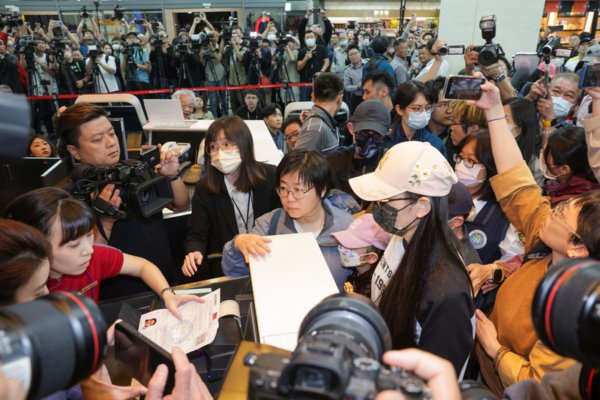Taiwanese immigration authorities revoked the residency permit and issued a departure deadline for mainland Chinese spouse Liu Zhenya (Ayaya) for openly advocating for unification by force. She departed from Taiwan and flew to Fuzhou on the evening of the 25th. A viral video showed Liu Zhenya arriving at Fuzhou airport and being escorted by plainclothes individuals wearing masks, her whereabouts becoming unknown after departure. The official Chinese Communist Party (CCP) response the following day accused the Taiwanese government of acting unjustly.
On the 26th in Beijing, the spokesman for the Taiwan Affairs Office of the State Council of China, Chen Binhua, criticized the Taiwan authorities for allegedly breaking up families and causing harm by employing “judicial means” against people promoting CCP’s unification through military force.
However, prior to departure, Ayaya tearfully pleaded for the revocation of the decision, expressing that being expelled from Taiwan pushed her and her family into an irreparable abyss. While some mainland and Taiwanese netizens supported her return to China and believed she should bring her children and even her husband back to her “beloved homeland,” experts in Taiwan questioned the complex nuances of the “Ayaya incident.”
Professor Li Youtan from the National Development Institute at Taiwan’s National Chengchi University stated in an interview that while the people of Taiwan have the freedom to advocate for independence or peaceful unification, supporting military aggression by the CCP is not a right anyone possesses. He emphasized that Ayaya’s act of openly endorsing CCP’s military aggression against Taiwan challenged the emotional and legal boundaries of the Taiwanese people. As she only held residency rights in Taiwan and not the citizenship of the Republic of China, her deportation was deemed appropriate by the government, taking into account the sensitivity of the situation.
“The Taiwanese people established a sovereign democratic nation in 1996 under a constitutional framework, ensuring freedom from fear, with no political prisoners, thought criminals, or prisoners of conscience,” Li stated. He emphasized that Ayaya’s advocacy for CCP’s military unification of Taiwan infringed upon the fundamental freedom from fear enjoyed by all Taiwanese, which is a crucial right among the four essential human freedoms.
Regarding Ayaya’s departure, both Chinese and Taiwanese netizens expressed mixed reactions, with some mocking her while she underwent the departure procedures at Fuzhou airport. Some online live streams capturing her arrival in mainland China swiftly disappeared after posting derogatory comments or sarcastic remarks about her.
Taiwanese political analyst Wu Jialong opined that Ayaya’s case underscored the importance of respecting the boundaries of freedom of speech enforced by the law. He highlighted that Ayaya’s conduct, particularly in making statements that threatened Taiwan’s security while enjoying the freedoms of the island, was incompatible with the legal framework.
With Ayaya’s departure, Taiwan faces a defining moment regarding freedom of expression, indicating that adaptation to local customs is essential for mainland Chinese spouses and foreign partners residing in Taiwan. The aftermath of Ayaya’s return to China serves as a reminder to others in similar circumstances.
Reflecting on the complexities of the “Ayaya incident,” educators and analysts suggested that her actions may have been influenced or manipulated, potentially exposing her to vulnerabilities upon return to China. The multifaceted nature of the incident and the involvement of various parties, including official Chinese media, raised concerns about deeper connections and potential coercion.
In light of the “Ayaya incident,” which stirred debates on social media platforms in both Taiwan and mainland China, analysts observed a firm resolve among the Taiwanese people in resisting CCP influence. This incident emphasizes the need for Taiwan to fortify its national security laws to counter external threats effectively.
Going forward, Taiwan must continue to reinforce its national security measures, addressing any legal loopholes and strengthening its resilience against CCP’s aggressive strategies. The incident has served as a poignant reminder of the delicate balance between safeguarding democracy and countering authoritarian forces in the region.

